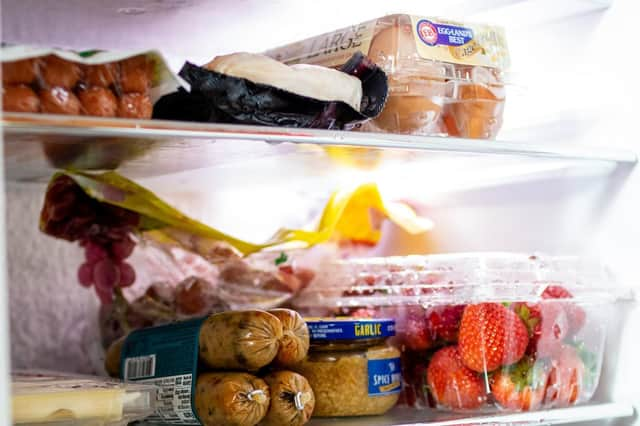DEBBIE MURPHY COLUMN: Do's and don'ts of storing food in your fridge


The fridge is a great way to keep food fresh, but sometimes the cooler temperature can produce unwanted effects, such as blackening, excess moisture, and softness for some foods...
so read on!
Here’s a list of some of the items that can cause some confusion:
Advertisement
Hide AdAdvertisement
Hide AdBananas – This one is easy. If you have ever stored a banana in the fridge, you would know the answer to this! A banana is used to a warmer climate than your fridge and it’s thought they release an enzyme in response to these cooler temperatures that will turn the skin black.
Best place? Leave in the warmth of a room. If you buy slightly green bananas, you can watch them ripen until they are perfect for you. If they start softening too much, never throw them away! Peel and place in the freezer. They are great in smoothies, cakes and breads like this.
Coffee – This one is open for debate. Ground coffee likes to be kept cool, dry and airtight, and as fridges do not really produce a dry environment it is best to avoid them.
Best place? In an airtight container in a cupboard, away from moisture and light. Buy small amounts if you don’t use much, so you always have the freshest coffee.
Advertisement
Hide AdAdvertisement
Hide AdChocolate – Another one open for discussion. Chocolate at room temperature has the most flavour and the best texture, but after a particularly hot summer where my bars looked more like chocolate sauce, I have been known to keep some of them in the fridge!
Best place? Store in a dark, cool cupboard for the best results. Cheaper, lower cocoa content chocolates may be better in the fridge during a hot summer though.
If you are a chocolate connoisseur and buy high-quality varieties, always keep at room temperature, or the chocolate police will come knocking!
Potatoes – When unpeeled potatoes are stored in the fridge, they are open to moisture, which won’t keep them fresh. It’s reported that keeping potatoes in the fridge will convert starch to sugar, giving you a sweeter potato and also increasing a chemical called acrylamide which is associated with bad health.
Best place? Store in a dark, cool and dry place.
Advertisement
Hide AdAdvertisement
Hide AdOnions – Some people do store raw, unpeeled onions in the fridge, but again, the moisture in there can cause them to go soft (and flavour everything else with onion!)
Best place? Store in a dark, cool, dry place for the longest life.
Fruits (apples, pears, plums, tomatoes) – I am rather partial to really cold apples and pears so I must admit, I do keep them in the fridge, but this is rather debatable too, especially if you grow lots of these in your garden.
Best place? If you are buying from a shop, you are best to keep them in the refrigerator in a plastic or paper bag to keep them as fresh as possible. If you have fruit or tomatoes that aren’t ripe, leave them at room temperature and then transfer to the fridge to prolong their perfect ripeness.
Advertisement
Hide AdAdvertisement
Hide AdBread – A fridge will dehydrate your bread, leaving it tough and quite dry. This is fine for toast, but you are better off to toast straight from the freezer, leaving little opportunity for waste.
Best place? In a cool and dry cupboard. If you don’t eat much, then use your freezer.
Eggs – Again debatable! We all see them on shelves in the shops, but then we place them in the fridge at home. Eggs like a consistent temperature to keep them fresh and a supermarket shelf tends to stay pretty much the same.
Best place? The consistent temperature of your fridge at home will keep your eggs fresh for longer, but it’s not essential.
Advertisement
Hide AdAdvertisement
Hide AdJams/ketchups/mayonnaise – You have all seen the recommendations to keep these, once opened, in the fridge, which we should perhaps be guided by, especially if you are someone who double dips a butter knife into the jam! Cream-based sauces should always be kept in a fridge, but if you can finish a bottle of ketchup in 1-2 weeks (like restaurants), you could leave your sauce in a cupboard.
It’s simple really. Always refer to the packaging for guidance if you are unsure, but don’t always assume the fridge will prolong your food life as it can hinder it!
We should all make a big effort to be more food-waste aware, so use your freezer, buy less where appropriate and don’t be drawn in by offers you won’t use.